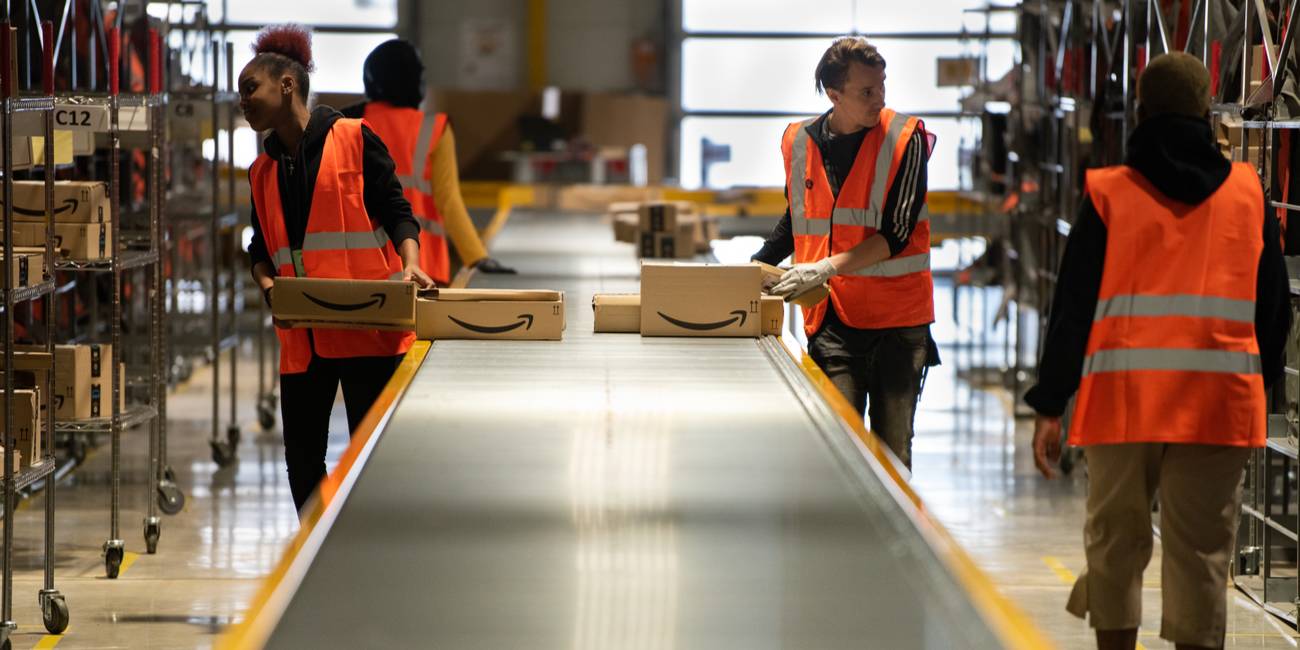Amazon A Prime Target Of Warehouse Law Protecting Bathroom Breaks

In a clear shot at Amazon, Minnesota lawmakers became the third state congressional body in America to pass a law protecting warehouse workers from unfair quotas and allowing them proper time for toilet breaks and the occasional meal.
Minnesota House Bill 36, was passed on Wednesday in the state senate by a razor-thin 34-33 margin after previously passing the house by a slightly wider 70-61 vote. While no one's mentioning Amazon by name, the consequences of the legislation will be clear for it.
If the bill is signed into law by Governor Tim Walz, which is likely given his views, it would place a number of restrictions on Amazon and other companies operating large warehouses, most notably a requirement that all employees are notified of each and every quota they're held to, and banning companies from taking any "adverse employment action" on employees failing to meet quotas that they weren't made aware of.
In addition, HB 36 also requires companies to not impose quotas "that prevent compliance with meal or rest or prayer periods" or use of restrooms – including the necessary time to get there and back again. Workers would also have the right to request a written description of the quotas they're held to, as well as 90 days of their own work speed data and aggregated data of employees in similar roles.
The bill also gives Minnesota labor law enforcement agencies the right to inspect any warehouse that has an employee injury rate at least 30 percent above the average yearly injury rate for such workers, and to have inspection rights and safety meetings.
The Strategic Organizing Center (SOC), a coalition of US labor unions, found in a report released last month that Amazon's injury rate at its warehouses was 70 percent higher than at non-Amazon warehouses last year.
Amazon's serious injury rate was more than double the industry average, SOC claimed. Similar numbers were reported in previous years, including 2021 when Amazon employees were injured at twice the rate as those working in Walmart facilities.
California was the first state to enact such rules in 2021 when Governor Gavin Newson signed AB 701 into law, requiring disclosure of production quotas and prohibiting disciplinary action for employees missing quotas due to health or safety-related breaks.
- Warehouse safety citations could cost Amazon seconds in revenue
- You're Shipt outta luck: App sued for treating delivery workers as contractors
- Rather than take the L, Amazon sues state that dared criticize warehouse safety
- I've got way too much cash, thinks Jeff Bezos. Hmmm, pay more tax? Pay staff more? Nah, let's just go into space
New York State passed a bill with similar rules last year, and the Minnesota proposal is quite similar in scope. Lawmakers in Washington and New Hampshire are also weighing similar actions.
Amazon objects
Amazon, naturally, disagrees with Minnesota's assessment of its warehouse safety practices, spokesperson Maureen Lynch Vogel told The Register. "At Amazon, employees' safety is our top priority and at the core of everything we do. Amazon does not have fixed quotas at our facilities."
"We assess performance based on safe and achievable expectations and take into account time and tenure, peer performance, and adherence to safe work practices," Lynch Vogel said, adding that Amazon knows it doesn't have a perfect safety record, but that the company is "committed to continuous improvement when it comes to communicating with and listening to our employees and providing them with the resources they need to be successful."
Amazon told us that it has invested more than $1 billion into safety since 2019, and since then has managed to reduce its injury rate by nearly a quarter. Despite those improvements, Amazon was hit with three citations from US safety inspectors earlier this year who found that warehouses in New York, Illinois, and Florida exposed employees to ergonomic hazards that put them at high risk for injuries and musculoskeletal disorders.
According to inspectors who visited the warehouses, Amazon's processes focus on speed to the detriment of employees, and at its Illinois facility still had nearly double the industry average injury rate. ®
From Chip War To Cloud War: The Next Frontier In Global Tech Competition
The global chip war, characterized by intense competition among nations and corporations for supremacy in semiconductor ... Read more
The High Stakes Of Tech Regulation: Security Risks And Market Dynamics
The influence of tech giants in the global economy continues to grow, raising crucial questions about how to balance sec... Read more
The Tyranny Of Instagram Interiors: Why It's Time To Break Free From Algorithm-Driven Aesthetics
Instagram has become a dominant force in shaping interior design trends, offering a seemingly endless stream of inspirat... Read more
The Data Crunch In AI: Strategies For Sustainability
Exploring solutions to the imminent exhaustion of internet data for AI training.As the artificial intelligence (AI) indu... Read more
Google Abandons Four-Year Effort To Remove Cookies From Chrome Browser
After four years of dedicated effort, Google has decided to abandon its plan to remove third-party cookies from its Chro... Read more
LinkedIn Embraces AI And Gamification To Drive User Engagement And Revenue
In an effort to tackle slowing revenue growth and enhance user engagement, LinkedIn is turning to artificial intelligenc... Read more

